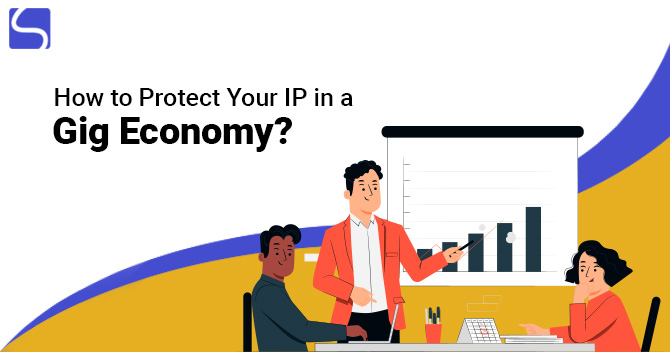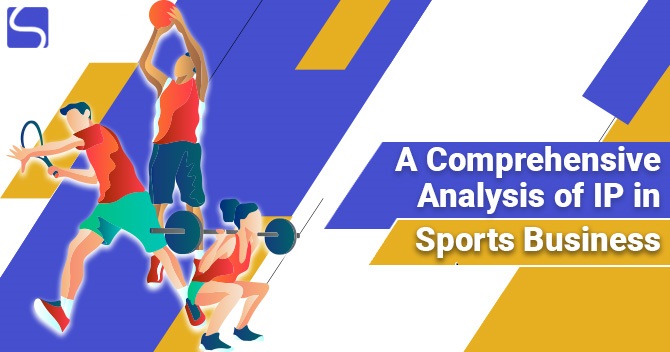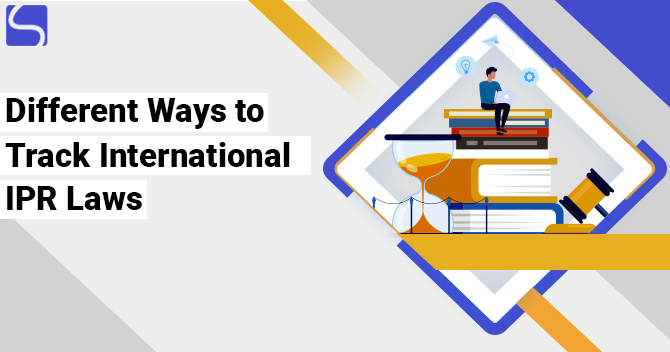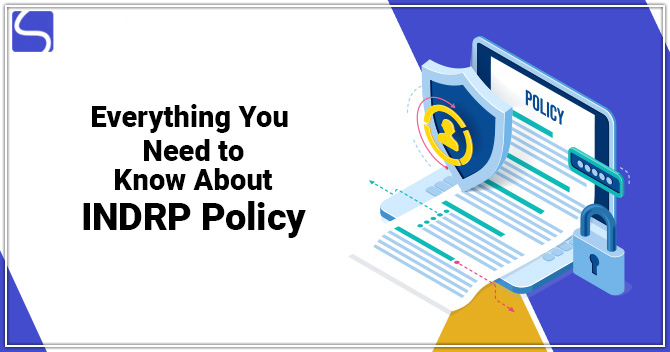How to Protect Your IP in a Gig Economy?

Karan Singh | Updated: Oct 27, 2021 | Category: Intellectual Property
Working distantly, the gig economy and contract work is rapidly increasing. Companies from various business sectors are all filling in labour gaps with gig workers, and many of them carry out their duties distantly. While this is suitable for both the contractor & the company, it leads to many business risks. One of the primary risks endangering IP (Intellectual Property). If your company is highly informative, your priority should be to control & maintain the proprietorship of your owner’s information when working with contractors. Companies who appoint contractors must know that many of the automatic legal protections increasing from an employment relationship don’t extend to a contractor. Scroll down to check more details regarding how an employer or a gig worker can protect their IP in a gig economy.
Table of Contents
What is a Gig Economy?
Before we discuss how can an employer or a gig worker protects their IP in a gig economy, let’s understand the meaning of gig economy. The gig economy includes the exchange of labour for money between companies or individuals through online platforms that actively assist matching between customers & providers. In simple words, the gig economy is where a high number of people work as remote workers, part-time, transitory, or independent contractors. Temporary or freelance positions are common, and companies always prefer hiring independent contractors & freelancers over full-time employees, especially in the Covid-19 pandemic.
The traditional economy of full-time workers, who are typically focused on their career advancement, is undercut by the gig economy. By making labour more reactive to the necessities of the economy and the requirement for a flexible lifestyle, the gig economy can benefit workers, customers, and firms. The advantages of the gig economy may be lost on those who don’t use technical services like the internet.
Moreover, at present, the internet has become so efficient that it allows people to work remotely and work in any situation. Finding work online is easy, and people working independently or from home are becoming rising frequently. Due to the pandemic, work from home has become the new normal.
The USA (United States of America) is on its way to becoming a gig economy because around 36% of the workers in the United States work as gig workers & 86% of freelancers think that the gig industry has a brighter future. If the gig economy keeps increasing at the current rate, more than 50& of the US (United States) workforce will participate in the gig economy by the year 2027, as per the reports.
Gig Worker and their Problems
The gig economy has become beneficial for both businesses and start-ups, such as lower recruitment costs, conveyance & other operating costs, remote work life, an increasing number of employees to work from home. This change has helped in the advancement of various concepts such as work from home from a holiday destination or place that would otherwise have been not possible usually.
However, failing to confirm that the hirer retains proprietorship of the IP generated or contributed to by independent contractors at the time of their engagement is a standard error when employing contractors for such new company efforts or side projects. Intellectual Property in such engagements can take different forms from graphic designs/artwork, computer code & software, artwork/graphic designs, other copyright-protected material, and inventions eligible for Patent Registration.
A common misunderstanding among small companies or businesses is that when they appoint a contractor, they are paying for the final product and thus the Intellectual Property[1]. Many businesses or companies also make the mistake of assuming that a contractor connection is identical to an employment relationship or connection, in which it is assumed that particular IP developed at the time of employment belongs to the employer.
Unfortunately, this is not the instance, and conditions frequently occur where contractors have taken the result from one engagement and used it for another row rose, attempting to commercialise it themselves.
Who has the Ownership? – IP in a Gig Economy
A contract that states IP ownership is useful to both freelancers & contractors and the business owner. In order to protect the business owners, and exclusivity clause is added in the agreement/contract to compel the contractor to work with the original IP of the company exclusively. In comparison, a suspicious employer may want to deem incorporating a condition in their employment agreement that provides them with the flexibility of part-time working.
The law is eventually the business owner’s responsibility, whether they are a contractor or an employer. An innovation industry expert can help gig workers or employers to understand it if they are having any issues.
How can a Gig Worker Protect Their IP in a Gig Economy?
Following are some methods to safeguard their IP in a gig economy:
- Duly-signed NDA from Freelancers: This is one of the best ways to protect your IP in a gig economy. Signing up of an NDA or Non-Disclosure Agreement build more trust between the parties signing this agreement. This agreement makes sure that despite heavy negotiations agreements or disagreements, the details should be safeguarded at all times. It prevents the misuse, misrepresentation, stealing of Intellectual Property. This NDA enables the company to share details regarding the IP asset in question without endangering the confidentiality of intangible assets. So to safeguard trade secrets and owner’s details, this method is vita in the business world.
- Use Strong Password: If anyone manages to gain access, then it is advisable to create a strong password. Use special characters & numbers in the password, and remember that you don’t have to stick to the requirement of minimum password length. Always use a passphrase instead of a single word to safeguard your account. In comparison to random letters & numbers, words are more difficult for hackers to crack but are still easy to remember.
- Service Agreement: This agreement is one of the vital tools to protect IP in a gig economy. This is a written agreement, and a written agreement always works in favour of the gig employer and gig worker both. With the help of a Service Agreement or a contractor, the organisation may get its house in order. If some contractors are being employed, the employer can use a template agreement; however, if the engagement is one-off or sophisticated, it must be a customised arrangement. So, before any of the parties reveal any of the IP or confidential details with each other, they should make sure that they have entered into a written agreement.
- Keep Your Files Safe: When you share your file with freelancers online, you have to take some precautions to keep your files safe, and you can check the same below:
- Make sure that health care data is compliant with safety & security standards like HIPAA;
- Before sharing or uploading files or information, try to avoid sharing personal information as much as possible. Only share that information which is necessary for the freelance to work on your project;
- While sharing, try to use passwords;
- Always give restricted access to documents by granting user-specific permissions like Google Docs.
- Arrange your Projects as per their risk level: The risk level depends on the project, the work type and the industry you want to be completed. For example, sharing details regarding food product recipes may be less risky than sharing information containing personal details. Understanding the risks involved can help you take precautionary measures. Breaking down big projects into small projects can also help you assess the risk involved at each & every stage and list all the safety measures that may be required.
Conclusion
After discussing how to protect IP in a gig economy, it is clear the gig economy employs a huge number of people who work from home or remotely. The primary issues are to protect IP in a gig economy created by a gig employer or worker during their engagement. So the best way is to resolve the problem of IPR ownership or proprietorship is to enter into a written agreement for appealing in a contract in the gig economy.
Read our article:Protecting IPR Against Unfair Trade Practices














